
By Noelle Rotte
As graduate business students, we are challenged to think critically, analyze data, and devise strategic solutions to real-world problems. One of the most exciting ways to put these skills to the test is through participation in case competitions. Recently, I had the opportunity to compete in my first case competition. It was challenging – and immensely rewarding.
A case competition involves teams coming together to tackle a business problem presented by a company or organization. It’s an opportunity for students to apply classroom knowledge to real-life scenarios — often under tight time constraints and intense pressure. These competitions give business students the chance to hone essential skills such as critical thinking, teamwork, presentation, and problem-solving.
In collaboration with United Airlines, the Kellstadt Marketing Group organized a case competition that pitted ten teams against each other. My team included three full-time MBA students: myself (Noelle Rotte), Shihab Chowdhury, and Alessia Serafino. Each team was tasked with devising a marketing strategy for United’s new uniform rollout. I was especially excited about the target audience for this marketing strategy. United has a diverse employee base; we had to consider how our strategy would resonate with people of all different generations, genders, races, ethnicities and other identities.
The competition began with teams submitting proposals outlining the marketing strategies they would use and how each strategy should be implemented. After the initial proposals were reviewed, five of the ten teams went on to the second round. Luckily, my team made it to the second round!
We were charged with bringing our proposals to life through a presentation. Each team was paired with a previous KMG president to bounce ideas from and provide feedback on what to include. We were paired with Zach Bosy, a Brand Manager of Disruptive Innovation at Kraft Heinz.
 On the day of the presentation, we were filled with a mixture of nerves and excitement. We felt prepared; we had completed and practiced our presentation, limited to just 15 minutes, the day before. Despite being the first team to present, we delivered our proposal with confidence. The subsequent question-and-answer session provided us with valuable insights and challenged us to defend our ideas.
On the day of the presentation, we were filled with a mixture of nerves and excitement. We felt prepared; we had completed and practiced our presentation, limited to just 15 minutes, the day before. Despite being the first team to present, we delivered our proposal with confidence. The subsequent question-and-answer session provided us with valuable insights and challenged us to defend our ideas.
Although my team did not emerge as the winners (shout-out to Devika Chaddha, Nikita Nese, and Souman Sami who came in first!) the experience left a lasting mark on me. It emphasized the significance of understanding your audience’s needs, the importance of preparation, and the value of taking risks.
So, to all aspiring business leaders: seize opportunities like these! They offer a unique chance to refine your skills, expand your network, and embark on a journey of self-discovery.


When Weam Abdalla moved to Chicago to start her MBA at Kellstadt, she already had experience in building a robust professional network from the ground up. Born in Saudi Arabia and educated in Sudan, where her family has roots, Abdalla launched her career in the United Arab Emirates. Abdalla’s experience is in human capital; she worked in recruitment consultancies for multinational firms, including a boutique consultancy that specializes in executive searches, leadership assessments and board appointments.
For Abdalla, earning an MBA was a natural next step. Kellstadt’s program stood out because it would allow her to focus on business strategy and decision-making. Abdalla started the program in fall 2023.
She arrived excited to take her career to the next level – and unsure about what building a professional network in a new cultural context would look like.
Now that she’s in her second quarter of the MBA, here are five of Abdalla’s key takeaways about networking:
1. Understand the Chicago Market
I kicked off with diving into market research, identifying the key industries and sectors in Chicago. I looked at the startup scene, hedge funds, consulting firms: at their employees and their backgrounds and the exciting job opportunities advertised. Thanks to “LinkedIn stalking,” as they call it, I gained a comprehensive view of professionals in these sectors. This gave me a solid idea of where I’d like to target after the MBA.
2. Utilize Alumni Networks
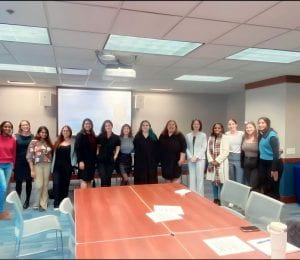
One of the networking events Abdalla attended.
Alumni! We already have one thing in common; a shared educational experience! Engaging with fellow graduates helped me gain valuable insights into Chicago’s vibrant business scene. I also reached out to DePaul alumni currently based in the UAE, and they responded positively to my inquires.
Additionally, I leveraged the incredible alumni network at DePaul University. There are so many opportunities here. We have Kellstadt Career Management Center events; Kellstadt Women in Business; graduate business students mixers; and more. As full-time MBA students, we really have a demanding schedule with case studies and assignments. But attending these events — even for a short period — is still time spent wisely.
3. Conduct Informational Interviews
Luckily, this activity was emphasized by two of my MBA professors at DePaul. I proactively reached out to professionals in my industry with careers I’d like to emulate. I used these conversations to delve deeper into the local market, gain advice, and expand my network organically. One way I implemented this was by reaching out to Chicago-based individuals at Michael Page, one of the companies I’d worked for in the UAE that also has a global presence.
4. Be Inquisitive
It can be easy to feel anxious or worry about how you come across. It can also be easy to overly focus on cultural differences and fail to notice underlying similarities. But as Dr. Rubin highlighted in Management 500, “we are more the same than we are different.” Finding common ground is easier than you think it will be! Approach conversations with curiosity, and, more often than not, people will be happy to share important aspects of themselves and their careers.
5. Be Patient

Abdalla with one of her classmates in the MBA program.
Building a new network is a gradual process, so don’t rush it – be patient and persistent. Give yourself the time needed to make meaningful connections, and don’t be discouraged by temporary setbacks, such as not getting responses on LinkedIn. Keep your focus on the long-term benefits of having an established network.
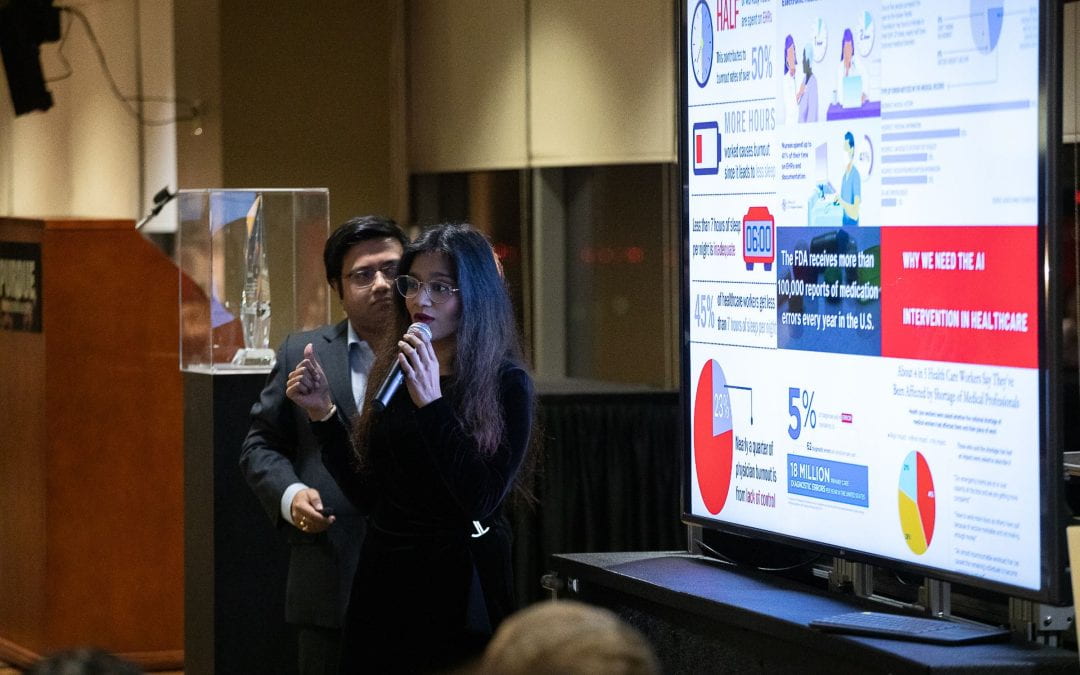
As Master in Business Analytics student Suprito Biswas sees it, business analytics brings together two distinct skillsets.
“You have to be well-versed in data,” he said, “and you have to have business acumen.”
This duality drew Biswas to study at DePaul’s Kellstadt Graduate School of Business. It also encapsulates the approach Biswas and classmate Shafeeqa Syeda took to competing in – and winning – the 2023 Data 4 Good case competition.
“Suprito’s from a technical background; I’m from a managing background,” said Syeda, an interior designer who runs a nonprofit focused on empowering women in business. “I think that was the perfect blend and that made us an amazing team. We knew what our roles were; there was no clash of interests.”
Hosted by Purdue University, the Data 4 Good competition is a two-month-long national challenge with more than $45,000 in prize money at stake. The charge: Use a large language model — the form of artificial intelligence at play in tools like Chat GPT – to extract relevant information from health care records without sacrificing accuracy.
Biswas and Syeda christened their team K3. They were drawn in, they said, by the chance to apply their skills as business analysts to a real-world context. Guidance from Kellstadt faculty was key to their success.
“Professor [Sina] Ansari played a major role in guiding us through the project,” said Syeda. An associate professor in the management and entrepreneurship department, Ansari has experience in the health care sector. “He was able to help us understand things we wouldn’t have thought of otherwise.”
The team put considerable effort into ensuring their solution kept sensitive data secure.
“Understanding the importance of data security — as a business analyst, that’s the most important thing you need to know,” said Syeda. “Someone’s trusting you with information that’s dear to them. You have to be really careful.”
Project management skills were just as important — another area where Syeda credits support from Kellstadt faculty, this time Assistant Professor of Management and Entrepreneurship Khadija Ali Vakeel.
Thanks to this support and their skills, team K3 emerged as regional champions in the Midwest: a region that comprised nearly 40% of the competition as a whole.
“Once we won the region,” Biswas said, “we knew we could potentially win the entire thing.”
Win they did.
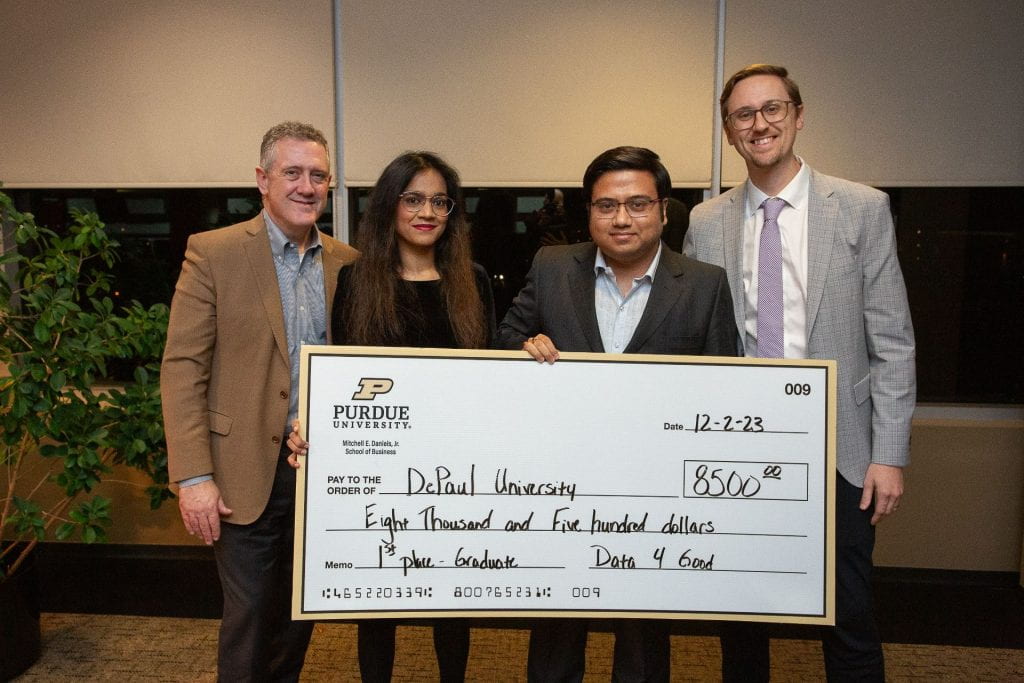
For both students, the national win — an honor that comes with $6,500 in prize money — affirmed their passion for their chosen field of study.
“No matter what field you’re in, you eventually come around to business analytics,” said Syeda. “This competition has given us massive experience when it comes to understanding a different industry altogether.”
Syeda plans to continue integrating AI into her course of study; Biswas is considering enrolling in health care-related electives.
Both students hope that their success will blaze a trail for other Kellstadt students.
“We want students to know there’s a lot of opportunities out there,” said Syeda. Sharing their story, Syeda said, “feels like our way of giving back to other students so they don’t have to reinvent the wheel.”
“We want students to understand that they can do this too,” said Syeda. “We did this alongside being full-time students and being board members of student organizations, the Kellstadt Marketing Group and the Kellstadt Business Analytics Organization. There was a lot of stage-managing; there was a lot of balancing multiple roles. But this is not something to get scared of. You do get a little overwhelmed. This shows that other students can do this too.”
As much as data analysis, business acumen and project management skills all played a role in the team’s win, the biggest takeaway for both students was the same.
“Friendship is what drove us to this competition,” said Syeda, “and what kept us going.
“The fact that Shafeeqa and I had a lot of trust in each other is extremely important,” echoed Biswas. “We each trusted that, whatever we were struggling with, the other person could solve it. We became much closer friends because of this experience.”
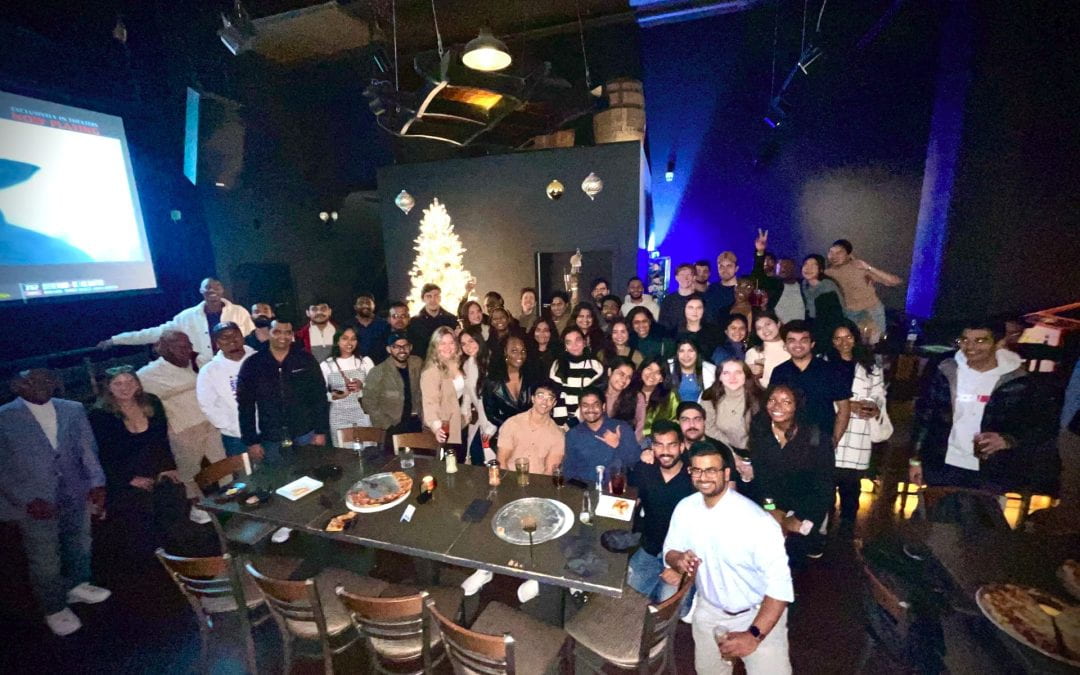
By Noelle Rotte, MBA student and VP of Communications and Outreach for the Kellstadt Collective
As a first-year student at the Kellstadt Graduate School for Business (KGSB), navigating the endless opportunities and organizations on campus is both exhilarating and overwhelming. However, amidst all the options available, one organization that stands out as a beacon of inclusivity, collaboration, and professional growth is the Kellstadt Collective.
My introduction to the Kellstadt Collective began with the opportunity to revamp the organization through my position as a graduate assistant. I have been able to work with four other MBA students to relaunch a group open to all of KGSB. Little did I know that the Kellstadt Collective was destined to become a cornerstone of my experience at DePaul.
A Successful First Event
Our first event, a study break/happy hour in the Fall Quarter, exceeded all expectations with nearly 70 students in attendance. Our event was located at 2Twenty2 Tavern, just a block away from DePaul’s Loop Campus. We brought together students from all Kellstadt programs, including the MBA and M.S. degrees in marketing, business analytics, hospitality leadership, finance, economics, accounting, supply chain management and many more. This event allowed KGSB students to meet new people outside of their program while grabbing a bite to eat and drinking a cocktail or two.
The success of this event is a testament to Kellstadt students’ desire for more in-person events tied with the ability to make meaningful connections in the KGSB community.
Looking ahead, we plan to hold a professional development event in the winter quarter and have other events, both professional and informal, in the pipeline. Kellstadt students — stay tuned!
From “Partners” to “Collective”
The Kellstadt Collective stemmed from the organization previously known as Kellstadt Partners. While the mission of the revamped organization is aligned closely with the original group’s mission, the leadership of the 2023-24 academic year felt compelled to redefine the group’s essence.
In particular: We felt that the term “partners” suggested a space for spouses or significant others, veering away from the essence of inclusion that truly defined the organization. The name Kellstadt Collective emerged because we wanted to embody a community built on the inclusion of all KGSB students.
We then decided to create a mission centered around the growth and inclusion of KGSB students. Our mission aims to:
- Foster an inclusive environment of collaboration, professional growth, and shared success by leveraging the diverse talents and backgrounds of our members.
- Build a dynamic community of forward-thinkers, innovators, and business leaders.
- Provide robust networking opportunities, enriching professional development experiences, and harnessing the collective spirit of DePaul University’s Kellstadt Graduate School of Business.
Our Leadership Team
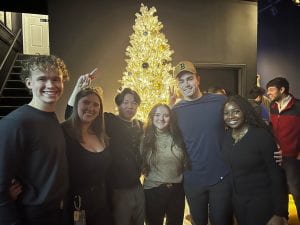
Driving the mission of the Kellstadt Collective is a dynamic leadership team, spearheaded by Noah Wallin as President, Noelle Rotte (myself) as VP of Communications and Outreach, Ashlee Bakunowicz as VP of Professional Development and Treasurer, Claude Mueller as VP of Event Coordination, and Niara Tomlinson as VP of Digital Marketing (featured below from left to right).
Each of us has a different background, with some born and raised in the Chicago area, while others are new to this city. Our leadership team was brought together through a Kellstadt Career Managment Center Graduate Assistantship, and we are committed to revitalizing the Kellstadt Collective and enhancing the KGSB experience.
Inclusive Engagement: How to Get Involved
Getting involved in the Kellstadt Collective is easy! The best ways to stay up to date are by following us on online platforms such as LinkedIn, Instagram, and DeHub. Our events are open to every Kellstadt Graduate Business student, so we welcome you to join our community.
As I head into my second quarter of my MBA, I reflect on how the leadership team came together to re-energize the Kellstadt Collective community. I am looking forward to the many networking events and growth opportunities that will come from the Kellstadt Collective. I hope you are too.
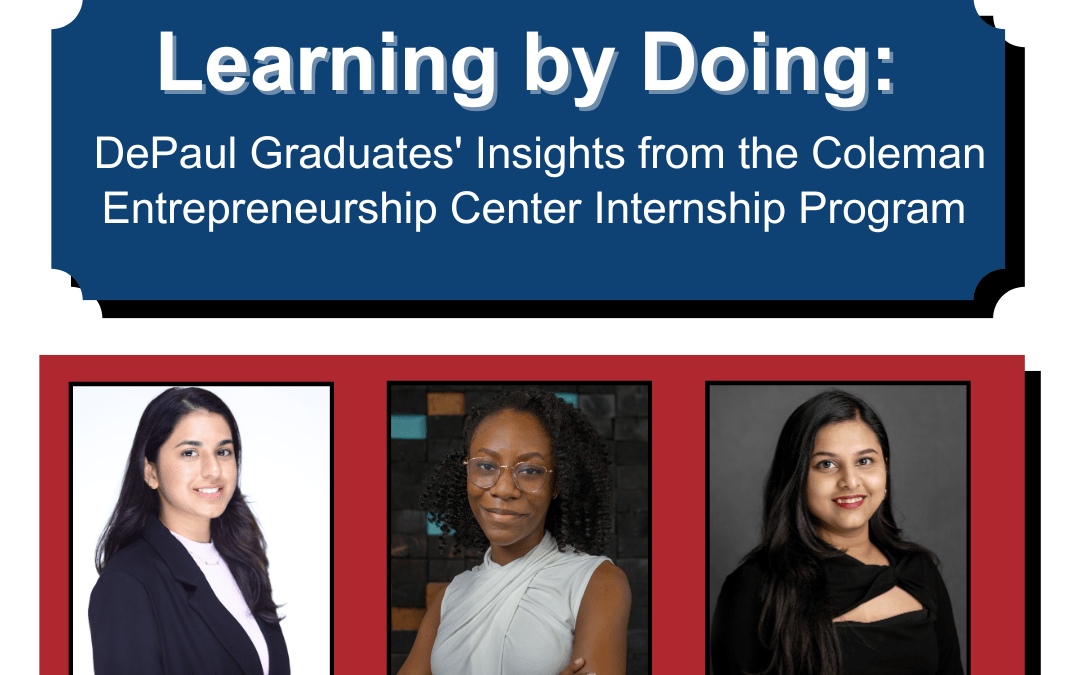
The Coleman Entrepreneurship Center is a hub of innovation and entrepreneurship programming at Kellstadt. Among its many resources are its summer internship program. Open to all Kellstadt students, the program expanded this year to include a track for organizations that focus on sustainability or on making a social impact.
Over on their blog, Entrepreneurship at DePaul, the Coleman center is sharing the stories of three of those interns. Two of them are from Kellstadt; one intern brings her expertise as a student in the school of public health. All three agreed: getting hands-on experience through the Kellstadt Graduate School of Business changed their trajectories for the better.
Read on for the first story in the series. And stay tuned into Entrepreneurship at DePaul for the rest!
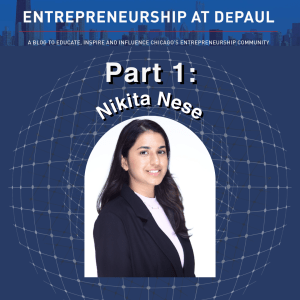
Growing up in the vibrant city of Bangalore, often dubbed the “Silicon City” of India, I was a part of an environment where startups thrived and the spirit of entrepreneurship was tangible. My goals of becoming an entrepreneur have never swayed. With my bachelor’s degree in engineering and nearly two years of experience as a software engineer under my belt, I now stand on the cusp of graduating from the MBA program at DePaul’s Kellstadt Graduate School of Business in spring 2024.
My interest in business strategy, development and crafting impactful marketing campaigns has influenced my choices at DePaul. While my academic decisions have shaped my educational trajectory, my extracurriculars are paving the way for my future career.
Last summer, a pivotal chapter in my career journey unfolded when the Coleman Entrepreneurship Center connected me with Qilo, a data analytics firm specializing in utility data, particularly electrical grid data. Their mission is to uncover energy-efficient and cost-saving solutions in this highly niche field.
At Qilo, I took on the role of a Digital Marketing/Business Development Intern, in which I worked directly under the CEO. Stepping into business management for the first time, especially within the unique context of a small-stage startup, was undoubtedly a daunting beginning.
The challenges I faced at Qilo were multifaceted. Delving into the intricacies of grid data and unravelling the industry’s complexities made for a steep learning curve. Furthermore, the highly competitive nature of the market necessitated that we distinguish ourselves.
Challenges aside, this journey was also marked by remarkable learning experiences. My time at Qilo deepened my understanding of data interpretation and marketing, enabling me to craft campaigns that resonated profoundly with our clients. From the ground up, Qilo entrusted me with solidifying the company’s brand identity and implementing rules and branding techniques. I conceptualized, executed and meticulously managed several campaigns that enhanced the organization’s digital presence by a significant percentage. Observing the tangible outcomes of my efforts cultivated a newfound sense of confidence and self-assurance.
In addition to this, I had the unique opportunity to represent the company at various industry events and conferences, where I was engaged in pitching to potential clients and investors. Not only did these experiences serve as a significant networking platform, but they also introduced me to influential figures within the industry.
Being part of the trajectory of a startup enterprise instilled in me a sense of solidity and innovation, both of which are crucial in a highly specialized field. My time at Qilo has unquestionably set the stage for my future. As I move on to the next chapter of my journey, I look forward to continuing in the active domain of business management strategy, with a particular focus on marketing within organizations. Since my internship, I have taken on the role of Director of Social Strategy and Communications for one of DePaul’s student organizations.
Looking beyond my academic journey, my post-graduation plans revolve around a career dedicated to marketing and business strategy. My time at Qilo fueled my entrepreneurial spirit. In the long term, I dream of establishing my own venture in business consulting.
My experiences at Kellstadt, including my transformative internship at Qilo, have shaped my career trajectory and instilled in me a deep sense of purpose and a passion for innovation and entrepreneurship. As I prepare to welcome the opportunities that lie ahead, I remain deeply grateful for the support and guidance from the Coleman Entrepreneurship Center that have brought me to this point in my journey.

 On the day of the presentation, we were filled with a mixture of nerves and excitement. We felt prepared; we had completed and practiced our presentation, limited to just 15 minutes, the day before. Despite being the first team to present, we delivered our proposal with confidence. The subsequent question-and-answer session provided us with valuable insights and challenged us to defend our ideas.
On the day of the presentation, we were filled with a mixture of nerves and excitement. We felt prepared; we had completed and practiced our presentation, limited to just 15 minutes, the day before. Despite being the first team to present, we delivered our proposal with confidence. The subsequent question-and-answer session provided us with valuable insights and challenged us to defend our ideas.











Recent Comments